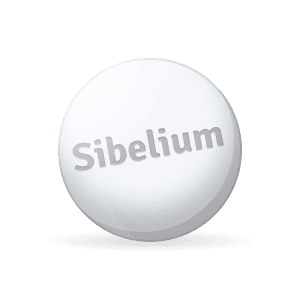10% Off COUPON CODE for New Customers: SAVE10

- Premium Quality
- Secure Payments
- SSL Secured Checkout
- Money Back Guarantee
- Fast & Discreet Delivery
 UNITED STATES:
UNITED STATES:Mar 4th - Mar 16th (10–18 Workdays) by AirMail
Feb 27th - Mar 4th (7–10 Workdays) by EMS
Sibelium
In Stock: Only 66 packs left
Sibelium is used to treat migraine, dizziness, and vertigo (unable to stand properly). It contains Flunarizine, prescribed for the improvement of blood flow and in the treatment of peripheral vascular diseases. Flunarizine has been used in medical practice for over 25 years. It was initially introduced as a medicine to improve blood flow and is a medicine known as a calcium channel blocker.
Sibelium 10 mg
| Package | Per Pill | Special Price | |
|---|---|---|---|
30 tabs | $1.10 | Only $33.00 | |
60 tabs | $0.60 | Only $36.00 | |
90 tabs | $0.44 | Only $40.00 | |
120 tabs | $0.35 | Only $42.00 | |
180 tabs | $0.24 | Only $44.00 |
Sibelium 5 mg
| Package | Per Pill | Special Price | |
|---|---|---|---|
30 tabs | $1.20 | $35.89 | |
60 tabs | $0.55 | Only $33.00 | |
90 tabs | $0.38 | Only $34.00 | |
120 tabs | $0.32 | Only $38.00 | |
180 tabs | $0.22 | Only $39.00 |
Common use
Sibelium is a Ca 2+ channel blocker and is used to prevent classic (with aura) or common (without aura) migraine, symptomatic treatment of vestibular vertigo. 5.9 mg of flunarizine hydrochloride is generallycontained in each capsule of this medication.
Dosage and direction
Recommended dose of Sibelium is two 5 mg capsules (10 mg) at night for adults. The dosage should be reduced to 5 mg daily in patients over 65 y.o. Stop taking the medication if any signs of depressive, extrapyramidal or other unacceptable symptoms occur or if after 2 months of this initial treatment no significant improvement is observed. In case of satisfactory initial treatment the maintenance treatment consists in 5 day course of taking of the same dose followed by 2 medicine free days every week.
Precautions
The regular intake of Sibelium doses is known to trigger drowsiness. Sibelium aggravates effects of alcohol or other central nervous system depressants. Avoid drinking alcohol when you are treated with this medication. Patients should be cautioned while driving vehicles or performing other tasks which are potentially hazardous and require high concentration of attention.
Contraindications
Sibelium is contraindicated in patients with known hypersensitivity to the drug, in patients with a history of depressive illness, and ones with a history of depression or pre-existing extrapyramidal disorders, in pregnant or breastfeeding patients.
Possible side effect
Most common side effects are drowsiness, fatigue, weight gain, increased appetite, agitation, sedation, and tachycardia. More rare adverse reactions are heartburn; gastralgia, nausea, insomnia, galactorrhoea, anxiety, muscle ache, dry mouth, skin rash. Long treatment with Sibelium caused depression (especially in women) and extrapyramidal symptoms (such as bradykinesia, rigidity, akathisia, orofacial dyskinesia, tremor, which are more frequent in elder patients.
Drug interaction
Hepatic enzyme inducers such as carbamazepine and phenytoin decrease blood levels of Sibelium due to enhancement of its metabolism. Women taking oral contraceptives developed galactorrhoea.
Missed dose
If you missed taking a dose of Sibelium you should contact your doctor as correction of your dose schedule may be required. Never double the dose of this medication.
Overdose
Known symptoms of overdose are sedation, agitation and tachycardia. Contact your doctor immediately if you suppose that too much of Sibelium was taken.
Storage
Store at room temperature, below 25 C (77 F) and out of reach and children and pets.
Disclaimer
We provide only general information about medications which does not cover all directions, possible drug integrations, or precautions. Information at the site cannot be used for self-treatment and self-diagnosis. Апу specific instructions for a particular patient should be agreed with your health care adviser or doctor in charge of the case. We disclaim reliability of this information and mistakes it could contain. We are not responsible for any direct, indirect, special or other indirect damage as a result of any use of the information on this site and also for consequences of self-treatment.
Shipping Policy
Orders are normally processed within 1–2 business days (Monday–Friday). Orders placed on weekends or holidays will be processed on the next business day.
Delivery Options
- Trackable Courier Service – $30
Delivered within 7–14 business days with online tracking. - Standard Airmail – $10
Economical option, delivery within 10–21 days. Tracking not available.
Free Express Delivery for orders over $300.
Free Airmail Delivery for orders over $200.
All packages are sent discreetly, without any reference to the pharmacy or medication on the parcel. Large orders may be divided into multiple shipments for logistical reasons.
Additional Paid Options
- Secret Packaging – $9.99
Ensures maximum privacy with unmarked, neutral wrapping and no external medication details. - Shipping Insurance – 10% of the order value
Why do you need insurance? Insurance protects you in case your order is lost or damaged during transit. In the event of a refund, the cost of insurance is not refundable.
Money-Back Guarantee
You have 24 hours to cancel your order after it has been placed. After that time, the order will be processed and shipped. Cancellations are no longer available once dispatched, but you may refuse the package upon delivery.
We offer a 30-day money-back guarantee from the date of delivery. If you are not satisfied with your order, contact our support within 30 days to receive a full refund.
Please note: Due to legal restrictions, we cannot accept returns of any medications once the package has been opened.
Secure Payments
All payments on our website are processed via a 128-bit SSL encrypted connection. Your credit card information is never stored on our servers — only the last four digits are visible for verification purposes.
Reviews
There are no reviews yet.